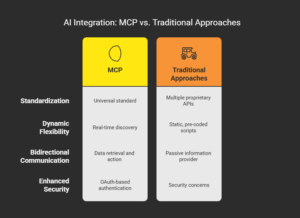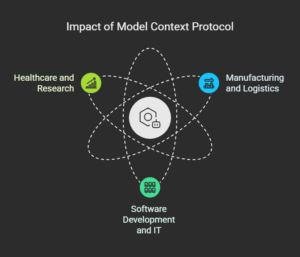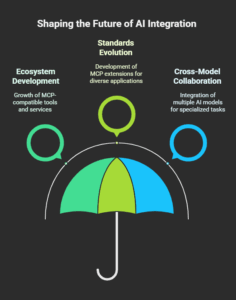
The quick-moving world of artificial intelligence (AI) is facing an essential dilemma. Contemporary AI systems demonstrate excellent abilities, yet experience difficulties while communicating digitally.
The Model Context Protocol (MCP) exists as a revolutionary technology that transforms AI agents’ interactions with data sources and tools through its role as a universal translator for artificial intelligence systems.
The Communication Barrier in Modern AI
The current generation of AI systems, including large language models (LLMs), faces a basic barrier because these powerful systems struggle to obtain the tools and data needed for optimal functionality.
The main impediments to deploying AI agents stem from data silos and system complexity which lead organizations to develop and maintain custom integration solutions for every new deployment, a project that spans weeks.
Prior to MCP, AI assistants required specially developed connectors to utilize basic system tools such as calendars and databases. The situation resulted in “context collapse” according to many industry experts, because AI systems functioned without essential information, while redundant computation happened when each integration required custom code.
This fragmentation created a paradoxical situation: Increasingly intelligent AI trapped in increasingly isolated environments. As one industry analyst noted, “We built incredibly smart AI that couldn’t see beyond its prompt window.”
Introducing the Model Context Protocol
The Model Context Protocol, introduced by Anthropic in late 2024, represents a paradigm shift in how AI systems connect with external resources. MCP is designed to act as a “universal translator” or “USB-C port” for AI, enabling seamless, secure and standardized connections between large language models and external data sources or tools.
At its technical core, MCP uses a client-server architecture based on JSON-RPC 2.0, allowing AI agents to invoke functions, fetch data and use predefined prompts from any MCP-compliant service, eliminating the need for custom code for each integration.
This standardized approach drastically reduces the complexity of integrating AI with external systems. “The Model Context Protocol is doing for AI what universal translators did for language barriers: creating a seamless way for AI systems to communicate with the world around them,” notes a March 2025 industry analysis.
How MCP Sets a New Standard for AI Integration

The Model Context Protocol is establishing a new paradigm for AI integration through several key mechanisms:
Standardization and Simplification
A dependable feature of MCP is eliminating multiple proprietary APIs and plugins by implementing one universal communication standard. Standardization under this approach significantly shortens the time needed for integration, while decreasing technical debt levels.
Through the implementation of MCP, developers achieve access to an entire network of compatible resources by applying the protocol only once and abolishing the requirement to write specific code for every new tool or data source.
Standardization provides maximum value to organizations that maintain complex IT environments containing several systems that require connection to AI agents. Active organizations that implement MCP technology escape the common delay of AI acceptance that typically occurs through standard integration practices.
Dynamic Flexibility
Unlike traditional integration approaches that rely on static, pre-coded scripts, MCP enables AI agents to dynamically discover and interact with new tools and data sources in real time. This flexibility allows AI systems to adapt to changing requirements without requiring developer intervention.
For example, an AI assistant implemented with MCP support could discover new data sources as they become available, automatically extending its capabilities without requiring code changes. The dynamic discovery mechanism enables more autonomous and adaptable AI systems.
Bidirectional Communication
MCP supports both data retrieval and action execution, enabling richer, more interactive AI workflows.
AI agents can not only access information but also take actions based on that information, creating more complete and useful automation scenarios. This bidirectional capability transforms AI from passive information providers to active participants in workflows. An MCP-enabled AI agent can, for instance, not only check a calendar for availability, but also schedule a meeting based on the information it finds.
Enhanced Security
Security concerns have traditionally been a significant barrier to AI integration, particularly when sensitive data is involved. MCP addresses these concerns by supporting OAuth-based authentication, ensuring secure, permissioned access to sensitive data and operations. This standardized security approach reduces the risk associated with AI integrations and makes it easier for organizations to implement appropriate access controls.
By providing a consistent security framework, MCP helps organizations maintain compliance with data protection regulations while still enabling powerful AI capabilities.
Real-World Impact and Adoption

The Model Context Protocol is already making a significant impact across multiple industries:
Manufacturing and Logistics
The early users of MCP technology in logistics items and manufacturing industries report notable positive outcomes for their supply chain operations and predictive equipment health management.
The operational efficiency and downtime reduction become possible through AI agents who can automatically process real-time data from various systems.
A manufacturing company integrated its AI monitoring system to factory floor sensors using MCP implementation. Unplanned downtime decreased by 35% after the AI system obtained data from various sources to anticipate equipment failures before they happened.
Software Development and IT
In developer tools, MCP allows AI assistants to connect to platforms like GitHub, Jira and internal databases in minutes, rather than weeks. This rapid integration enables more efficient development workflows and reduces the barrier to adopting AI-powered development tools.
A software development team reported that implementing MCP reduced the time required to integrate their AI code assistant with their codebase from three weeks to just four hours. This dramatic reduction in integration time allowed them to focus on improving the assistant’s capabilities rather than struggling with connection issues.
Healthcare and Research
The implementation of MCP enables healthcare organizations to link AI systems to electronic health records, as well as imaging systems and research databases.
Healthcare facilities can conduct advanced analytical operations and aid clinical decisions through this unified system, which operates with protected privacy measures. A research hospital deployed MCP to let diagnostic AI gain access to patient documentation, combined with clinical information and diagnostic results. A combined system that unified previous isolated procedures showed a diagnostic improvement of 22%, better than traditional isolated practices.
Comparing Integration Approaches: Before and After MCP
The transformation enabled by MCP becomes clear when comparing traditional integration approaches with MCP-based solutions:
|
Feature |
Pre-MCP (Custom APIs/Plugins) |
With MCP (Universal Protocol) |
|
Integration Time |
Weeks per new tool |
Minutes to hours |
|
Maintenance Overhead |
High (custom code per source) |
Low (one protocol, many sources) |
|
Flexibility |
Static, hardcoded |
Dynamic, real-time discovery |
|
Security |
Inconsistent |
Standardized, OAuth support |
|
Scalability |
Poor |
High |
This comparison highlights the significant advantages of the MCP approach, particularly for organizations that need to integrate multiple data sources and tools with their AI systems.
Enabling Agentic AI
The industry considers MCP as essential for building “agentic AI” capabilities that let autonomous agents manage various environments independently of human supervision.
Standardized environmental interaction enabled by MCP decreases the necessity for human involvement when managing AI workflows. The feature becomes highly useful for intricate multi-step processes extending across various systems. An AI agent connected through MCP can take control of the entire customer onboarding sequence while working with customer databases and updating CRM systems and creating documents, and establishing follow-up appointments without necessitating specific step-by-step programming.
As one industry analyst notes: “MCP is the missing link that transforms AI from intelligent responders to autonomous actors capable of carrying out complex tasks across multiple systems.”
The Future of AI Integration

As MCP adoption continues to grow, several trends are emerging that will shape the future of AI integration:
Ecosystem Development
A vibrant ecosystem of MCP-compatible tools and services is developing, making it increasingly easier for organizations to connect their AI systems with existing resources. This ecosystem effect is creating a virtuous cycle, where more MCP adoption leads to more compatible tools, which in turn drive further adoption.
Standards Evolution
The MCP standard itself is evolving to address new use cases and requirements. Working groups are developing extensions for specific industries and scenarios, ensuring the protocol remains relevant and useful across diverse applications.
Cross-Model Collaboration
MCP is enabling new forms of collaboration between different AI models, allowing organizations to leverage the strengths of multiple systems working together. Rather than choosing a single AI provider, organizations can create integrated solutions that combine specialized models for specific tasks.
Conclusion
The Model Context Protocol introduces transformative changes to artificial intelligence systems’ connection methods with their surrounding environment. It functions as a universal translator to enable the establishment of connected context-aware systems, which will replace standalone and context-dependent AI systems. MCPalso establishes a normalized data access method for AI agents to securely use various tools and sources, thus achieving new benchmarks for AI capability.
Industry experts stated that MCP is equivalent to HTTP functions for the web because it establishes a common language between formerly independent systems. A universal translator between AI systems eliminates barriers between components, so AI becomes just as adaptable in communication as human beings.
MCP also guides organizations toward AI investment success through simplified integration procedures that enhance security and empower AI systems with greater autonomy. Its widespread adoption will probably make it just as crucial for AI infrastructure development as application programming interfaces (APIs) are for contemporary software building.

